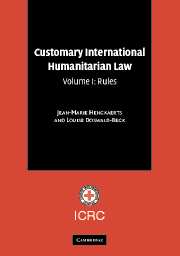Book contents
- Frontmatter
- Contents
- Foreword by ICRC President Jakob Kellenberger
- Foreword by Judge Abdul G. Koroma
- Foreword by Yves Sandoz
- Acknowledgements
- Introduction
- List of abbreviations
- Part I The Principle of Distinction
- Part II Specifically Protected Persons and Objects
- Part III Specific Methods of Warfare
- Part IV Weapons
- Part V Treatment of Civilians and Persons Hors De Combat
- Part VI Implementation
- Chapter 40 Compliance with International Humanitarian Law (Rules 139–143)
- Chapter 41 Enforcement of International Humanitarian Law (Rules 144–148)
- Chapter 42 Responsibility and Reparation (Rules 149–150)
- Chapter 43 Individual Responsibility (Rules 151–155)
Chapter 40 - Compliance with International Humanitarian Law (Rules 139–143)
Published online by Cambridge University Press: 05 June 2012
- Frontmatter
- Contents
- Foreword by ICRC President Jakob Kellenberger
- Foreword by Judge Abdul G. Koroma
- Foreword by Yves Sandoz
- Acknowledgements
- Introduction
- List of abbreviations
- Part I The Principle of Distinction
- Part II Specifically Protected Persons and Objects
- Part III Specific Methods of Warfare
- Part IV Weapons
- Part V Treatment of Civilians and Persons Hors De Combat
- Part VI Implementation
- Chapter 40 Compliance with International Humanitarian Law (Rules 139–143)
- Chapter 41 Enforcement of International Humanitarian Law (Rules 144–148)
- Chapter 42 Responsibility and Reparation (Rules 149–150)
- Chapter 43 Individual Responsibility (Rules 151–155)
Summary
Rule 139. Each party to the conflict must respect and ensure respect for international humanitarian law by its armed forces and other persons or groups acting in fact on its instructions, or under its direction or control.
Practice
Volume II, Chapter 40, Section A.
Summary
State practice establishes this rule as a norm of customary international law applicable in both international and non-international armed conflicts. The term armed forces, as used in the formulation of this rule, must be understood in its generic meaning.
States
The obligation of States to respect international humanitarian law is part of their general obligation to respect international law. This obligation is spelled out in the 1929 and 1949 Geneva Conventions. Common Article 1 of the 1949 Geneva Conventions, however, has enlarged the formulation of this requirement to incorporate an obligation to ensure respect for international humanitarian law. This obligation to respect and ensure respect is also found in Additional Protocol I.
The obligation to respect and ensure respect for international humanitarian law is found in numerous military manuals. It is supported by the practice of international organisations and international conferences. There is also international case-law in support of this rule.
A State's obligation pursuant to this rule is not limited to ensuring respect for international humanitarian law by its own armed forces but extends to ensuring respect by other persons or groups acting in fact on its instructions, or under its direction or control.
- Type
- Chapter
- Information
- Customary International Humanitarian Law , pp. 495 - 508Publisher: Cambridge University PressPrint publication year: 2005
- 4
- Cited by



